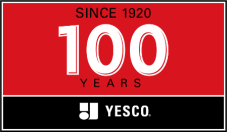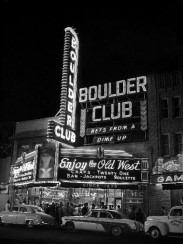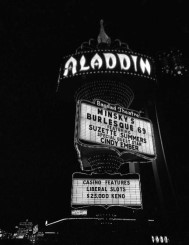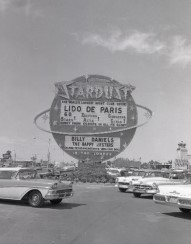



L to R: Boulder Club/Photo 5947, Aladdin/Photo 19038-7, Stardust/Photo 7232-3
(Photos Courtesy of the LVCVA’s Las Vegas News Bureau Archive)
YESCO ANNOUNCES NEW EXHIBIT “LIGHTING UP LAS VEGAS:
YESCO MARKS A GLITTERING CENTURY” TO MOVE TO EAST LAS VEGAS LIBRARY BEGINNING SEPT. 15
WHAT:
YESCO, the 102-year-old company known for creating, repairing and maintaining internationally recognizable signs, announces its new exhibition, “Lighting Up Las Vegas: YESCO Marks a Glittering Century,” will move to the East Las Vegas Library. Currently on display at the Clark County Museum through Monday, August 29 and formerly at the Nevada Humanities Gallery in downtown Las Vegas, this exhibition will open to the public at the East Las Vegas Library on Thursday, September 15. This exhibition is sourced from the LVCVA News Bureau’s extensive archive collection and from UNLV’s Special Collections. This joint exhibition, organized with the support of the LVCVA’s Las Vegas News Bureau and The Neon Museum, examines the history and impact of YESCO in Las Vegas.
The exhibit was originally planned for 2020 to celebrate YESCO’s 100th anniversary, which took place that year, but was delayed due to the COVID pandemic. “Lighting Up Las Vegas” follows the intertwined stories of the company, city and technology, as well as the men and women who made it all possible.
Las Vegas and neon are synonymous with each other. When anyone thinks of Las Vegas, their mind’s eye instantly conjures images of its dazzling skyline and brilliant lights. YESCO has played a significant role in creating Las Vegas’ shining reputation. The company has created countless signs defining the look and feel of Las Vegas. From its early use of neon on Fremont Street in the 1930s, to the Strip “spectaculars” of the 1950s and 1960s, to the cutting-edge technologies of today, YESCO has shaped the image of Las Vegas. Its iconic signs have come to be recognized as works of art, and their significance transcends their function as mere advertisements.
WHO:
YESCO specializes in the manufacture of custom electric signs, sign maintenance and out-of-home advertising. In addition, YESCO operates sign and lighting service repair stores throughout North America as well as a sign financing business. Thomas Young founded the company in Ogden, Utah, in 1920 after borrowing $300 from his father. YESCO began by offering wall painted advertisements, gold-leaf window lettering and coffin plates. Today, helmed by the second, third and fourth generations of the founder’s family, YESCO creates, services and maintains award-winning displays for some of the most prestigious brands. For more information, go to www.YESCO.com.
PHOTOS ON DISPLAY INCLUDE:
Boulder Club/Photo 5947:
In 1945, the Boulder Club hired YESCO to redesign its 1933 sign. The new sign, credited as the first “spectacular,” combined a tall vertical tower that read “Boulder Club” and “Enjoy the Old West.” The sign industry used the term “spectacular” to refer to the largest and brightest signs.
Aladdin/Photo 19038-7:
YESCO and AD-ART competed for the Aladdin sign. YESCO won the bid, and they designed and installed it in 1966. The three-sided marquee featured a modeled genie lamp at the top covered in incandescent bulbs.
Stardust/Photo 7232-3:
In 1958, YESCO’s design for the Stardust set a new standard for signage on the Strip. Designed by Kermit Wayne, the sign wrapped the building in neon and featured three-dimensional planets and comets. It was 216 feet long and 27 feet high.
Photo by Milt Palmer/Las Vegas News Bureau.
WHERE:
East Las Vegas Library
2851 East Bonanza Road
Las Vegas, NV 89101
DATES:
Sept. 15 – Nov. 20
Open Monday through Thursday from 10 a.m. to 8 p.m. and Friday through Sunday from 10 a.m. to 6 p.m.
SOCIAL MEDIA:
Facebook, Instagram: @yescosigns
Twitter: @yesco_signs
HASHTAGS:
#LightingUpLasVegas
#YESCO102Years
ABOUT LAS VEGAS NEWS BUREAU
For nearly 75 years, the Las Vegas News Bureau has captured the sights and sounds of Las Vegas. The News Bureau was originally a part of the marketing efforts of the Las Vegas Chamber of Commerce, but it has been a division of the Las Vegas Convention and Visitors Authority (LVCVA) for nearly 30 years. It has played a unique role in promoting Las Vegas by documenting unforgettable images. Today, the collection consists of more than 7 million images, 11,000 pieces of film and video, and 1,400 linear feet of manuscripts and artifacts. It continues to play an important role in marketing Las Vegas as a premier destination for business and leisure travel. The Bureau’s active preservation program safeguards this rich and living archive of Las Vegas history for future generations.
ABOUT THE LVCVA
The Las Vegas Convention and Visitors Authority (LVCVA) is charged with marketing Southern Nevada as a tourism and convention destination worldwide and with operating the 4.6 million square-foot Las Vegas Convention Center (LVCC). With nearly 150,000 hotel rooms and 14 million square feet of meeting and exhibit space in Las Vegas alone, the LVCVA’s mission centers on attracting leisure and business visitors to the area. The LVCVA also owns the Las Vegas Convention Center Loop designed and operated by The Boring Company and also owns the Las Vegas Monorail, an elevated 3.9-mile system with seven stops throughout the resort corridor.
ABOUT THE NEON MUSEUM
The Neon Museum is a non-profit 501(c)3 organization dedicated to collecting, preserving, studying, and exhibiting iconic Las Vegas signs for educational, historic, arts, and cultural enrichment. Its two-acre campus includes an outdoor exhibition space known as the Neon Boneyard. The museum collection also includes several restored signs installed as public art throughout downtown Las Vegas. Both the Neon Boneyard and museum’s La Concha Visitors’ Center are located at 770 Las Vegas Blvd. North, Las Vegas, NV.
